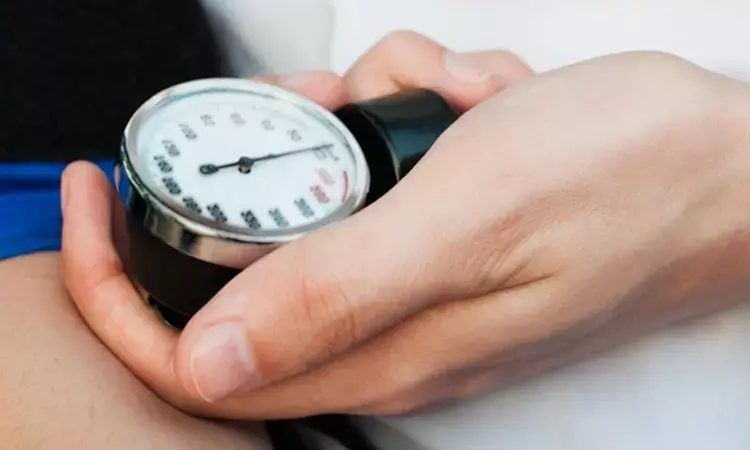- Home
- Medical news & Guidelines
- Anesthesiology
- Cardiology and CTVS
- Critical Care
- Dentistry
- Dermatology
- Diabetes and Endocrinology
- ENT
- Gastroenterology
- Medicine
- Nephrology
- Neurology
- Obstretics-Gynaecology
- Oncology
- Ophthalmology
- Orthopaedics
- Pediatrics-Neonatology
- Psychiatry
- Pulmonology
- Radiology
- Surgery
- Urology
- Laboratory Medicine
- Diet
- Nursing
- Paramedical
- Physiotherapy
- Health news
- Fact Check
- Bone Health Fact Check
- Brain Health Fact Check
- Cancer Related Fact Check
- Child Care Fact Check
- Dental and oral health fact check
- Diabetes and metabolic health fact check
- Diet and Nutrition Fact Check
- Eye and ENT Care Fact Check
- Fitness fact check
- Gut health fact check
- Heart health fact check
- Kidney health fact check
- Medical education fact check
- Men's health fact check
- Respiratory fact check
- Skin and hair care fact check
- Vaccine and Immunization fact check
- Women's health fact check
- AYUSH
- State News
- Andaman and Nicobar Islands
- Andhra Pradesh
- Arunachal Pradesh
- Assam
- Bihar
- Chandigarh
- Chattisgarh
- Dadra and Nagar Haveli
- Daman and Diu
- Delhi
- Goa
- Gujarat
- Haryana
- Himachal Pradesh
- Jammu & Kashmir
- Jharkhand
- Karnataka
- Kerala
- Ladakh
- Lakshadweep
- Madhya Pradesh
- Maharashtra
- Manipur
- Meghalaya
- Mizoram
- Nagaland
- Odisha
- Puducherry
- Punjab
- Rajasthan
- Sikkim
- Tamil Nadu
- Telangana
- Tripura
- Uttar Pradesh
- Uttrakhand
- West Bengal
- Medical Education
- Industry
Deprescribing BP medications does not disturb BP control in elderly: JAMA

UK: A recent study published in the journal JAMA throws light on whether medication reduction in older patients can help achieve blood pressure (BP) control. According to the study, the reduction of antihypertensive medications in older adults with hypertension was not associated with a substantial change in blood pressure control.
The findings suggest that in some older patients with hypertension, the reduction of antihypertensive medication can be achieved without substantial change in blood pressure control.
Deprescribing of antihypertensive medications is recommended for some older patients with polypharmacy and multimorbidity when the benefits of continued treatment may not outweigh the harms. James P. Sheppard, Nuffield Department of Primary Care Health Sciences, University of Oxford, Oxford, United Kingdom, and colleagues conducted the study to determine whether antihypertensive medication reduction is possible without significant changes in systolic blood pressure control or adverse events during a 12-week follow-up.
This noninferiority OPTIMISE trial included 569 participants (mean age, 84.8 years; median of 2 antihypertensive medications prescribed at baseline). They were randomly assigned to receive to a strategy of antihypertensive medication reduction (removal of 1 drug [intervention], n = 282) or usual care (control, n = 287), in which no medication changes were mandated in ratio 1:1.
The primary outcome was systolic blood pressure lower than 150 mm Hg at a 12-week follow-up.
Key findings of the study include:
- Overall, 229 (86.4%) patients in the intervention group and 236 (87.7%) patients in the control group had a systolic blood pressure lower than 150 mm Hg at 12 weeks (adjusted RR, 0.98).
- Of 7 prespecified secondary endpoints, 5 showed no significant difference.
- Medication reduction was sustained in 187 (66.3%) participants at 12 weeks.
- Mean change in systolic blood pressure was 3.4 mm Hg higher in the intervention group compared with the control group.
- Twelve (4.3%) participants in the intervention group and 7 (2.4%) in the control group reported at least 1 serious adverse event (adjusted RR, 1.72).
The researchers found that among older patients treated with multiple antihypertensive medications, a strategy of medication reduction, compared with usual care, was noninferior with regard to systolic blood pressure control at 12 weeks.
"The findings suggest antihypertensive medication reduction in some older patients with hypertension is not associated with a substantial change in blood pressure control, although further research is needed to understand long-term clinical outcomes," the authors concluded.
The study, "Effect of Antihypertensive Medication Reduction vs Usual Care on Short-term Blood Pressure Control in Patients With Hypertension Aged 80 Years and Older: The OPTIMISE Randomized Clinical Trial," is published in the journal JAMA.
Dr Kamal Kant Kohli-MBBS, DTCD- a chest specialist with more than 30 years of practice and a flair for writing clinical articles, Dr Kamal Kant Kohli joined Medical Dialogues as a Chief Editor of Medical News. Besides writing articles, as an editor, he proofreads and verifies all the medical content published on Medical Dialogues including those coming from journals, studies,medical conferences,guidelines etc. Email: drkohli@medicaldialogues.in. Contact no. 011-43720751


